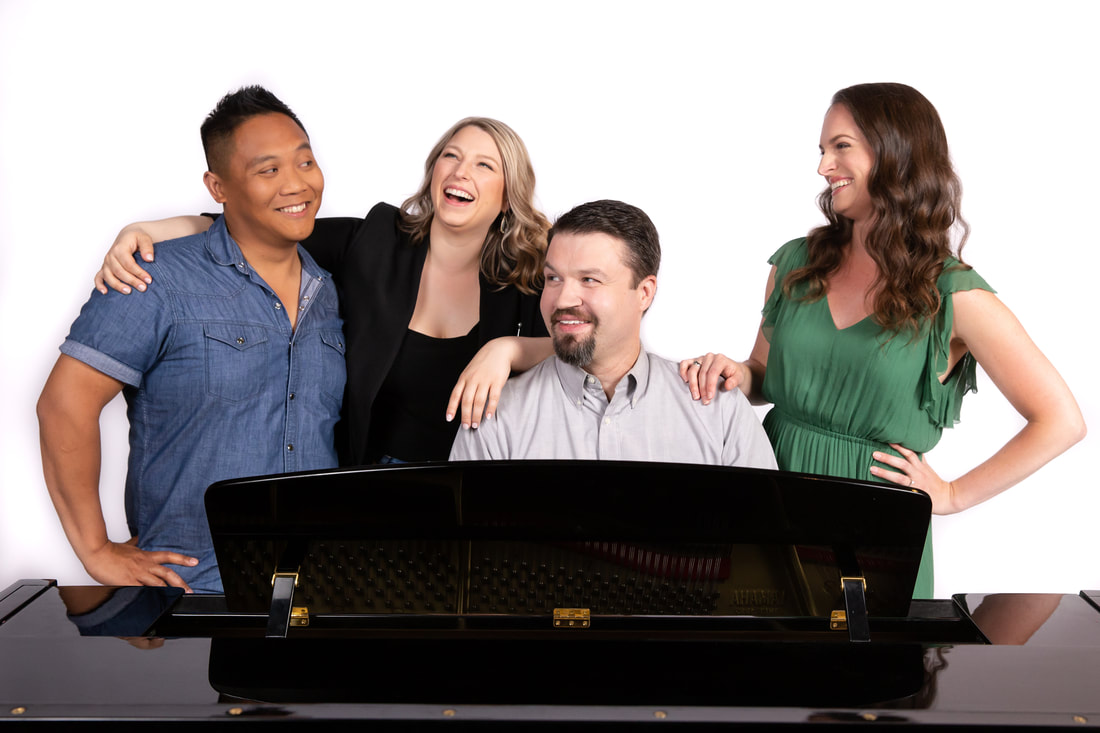|
David: For most singers, the art that we create is a communal experience. The synergy of a choir of voices generates the magic of the music that we love. While the music itself has been conspicuously absent this year, singers have also missed out on countless hours of making music with colleagues who are also dear friends. The pandemic has reminded us not to take friendship for granted, and I have acquired very specific memories of seeing friends for the first time after quarantine. This week on The Art Song Fix we are showcasing "The Pleasures of Friendship" from Wayland Rogers’ I-Thou, a light-hearted celebration of spending time with companions. It has indeed been a pleasure to continue to make music with my Fourth Coast friends! Sarah: This song is one of my favorite movements from I-Thou, a song cycle for vocal quartet commissioned by Fourth Coast and premiered in May 2018. It’s a lively a cappella fugue for the four voices, truly capturing the joy and “Pleasures of Friendship” in the playful way the theme bounces between the voices. After one full statement of the jaunty theme by the soprano, the tenor next presents the melody with interjections bouncing off by soprano and mezzo in duet, followed by a more complete trio version by the three voices. Finally, the bass enters in a new key, infusing new energy into the quartet of friends as they react to one another’s statements. The four voices expand into a flurry of activity before all coming together to end in unified rhythm and a unison note - a beautiful encapsulation of friends joining! Bridget: English poet Stevie Smith's work commonly portrays scenes of innocence and nostalgia, often nursery-rhyme-like on the surface. "The Pleasures of Friendship" is the perfect example of just such a work. However, critics agree that despite the whimsical appearance of her work, Smith was a significant talent whose distinct style grew more consistent and refined throughout her life. The deceptive simplicity of her poetry was described by the Times Literary Supplement as her "most distinctive achievement." Smith's scenes of simple joy remind us that life is short, and every walk through the grass with friends should be savored. Ace: We have done a few of these virtual video performances now, and at this point, the whole process of recording and editing feels quite normal to us. We have learned more about audio and video than most classical singers probably dreamed would be so necessary and useful. Still, while standing in a closet alone, singing to a track and click of a metronome and taking video selfies while performing to an imaginary audience no longer feels as awkward and stilted as it did at first, truly nothing can replace the real deal. The quartet is in “hybrid mode” now with a few livestream concerts under our belt, music videos like this, and a return to in-person rehearsals just this past week. It was refreshing to be able to, collectively in real-time, discuss interpretation, how to color and shape phrases, balance our voices, place our cutoffs, etc.—you know, normal music things! The intimacy of making eye contact and breathing together is pulling us out from within the literal and figurative walls that have contained us for the past year. We sense the returning thrill and pressure of having to create something beautiful together in the moment for a live audience, and we cannot wait to share more about the exciting plans we have for the summer and for next season. Stick with us, and stay tuned! AuthorFourth Coast Ensemble is a classical vocal quartet specializing in the unique style and repertoire of vocal chamber music. Celebrated for its "horizon-expanding programming, (Chicago Classical Review), Fourth Coast Ensemble embraces a repertoire that spans the history of the genre, from Schubert and Brahms to composers of the present day. The ensemble has earned a reputation of excellence "built on the quality of its small roster of artists" (Vocal Arts Chicago) - soprano Sarah van der Ploeg, mezzo-soprano Bridget Skaggs, tenor Ace Gangoso, and bass-baritone David Govertsen.
1 Comment
Many of you commented on how much you enjoyed my valentine serenade of ‘Plaisir d’amour’ on guitar. I thoroughly enjoyed putting that together, so I have been cooking up a few other similar projects. A number of Schubert songs came to mind that might be possible to adapt for guitar, and with spring upon us I thought ‘Heidenröslein’, a song about a little rose, might be the perfect choice.  Photo by Biel Morro on Unsplash Composed on August 19, 1815 (a day on which Schubert also set four other poems of Johann Wolfgang von Goethe to music), ‘Heidenröslein’ tells the story of a boy who encounters a beautiful rose which he decides to pick, despite the little rose’s warning that she will prick him if he does so. The metaphor is difficult to miss; the little rose that the boy spies represents a young girl, and the boy feels the sting of thorns as he attempts to court her. In fact Goethe’s poem has inspired numerous illustrations over the years, and nearly all of them feature an eager young man inquiring after a demure young woman, with a field of roses essentially incidental to the scene. Perhaps the thing that I most enjoy about ‘Heidenröslein’ is that it offers the singer a chance to portray multiple characters in the space of just a few lines of text and music. The narrator sets the scene, the boy makes his move, the rose strikes back, and the refrain seems to comment on the action after each verse: ‘Röslein, Röslein, Röslein rot, Röslein auf der Heiden.’ Of course the music ties it all together, and Schubert in his usual way has managed to create a song that is simple like a folksong and yet full of variety and color. Although the musical material is identical each time, the instrumental coda that follows each strophe is somehow able to capture three different moods; from the excitement of seeing the rose in the beginning, to the admonishing tone of the rose in the middle, to the inevitable moral of the story at the end. The alternating bass line and chord structure of this song seemed a natural fit for the guitar idiom, and my fingers got a bit of a workout on the instrumental interludes after each verse. I hope you enjoy my six-stringed version of this classic Schubert song!
|
SUBSCRIBEAboutHello, and welcome to the blog! We are Fourth Coast Ensemble, Chicago's classical vocal quartet. Join a different member of our ensemble for insights into our favorite art songs, links to archival and new recordings, and reflections on why we value and continue to come back to this musical medium. We proudly present, your #artsongfix! Archives
June 2023
Categories
All
|



 RSS Feed
RSS Feed
